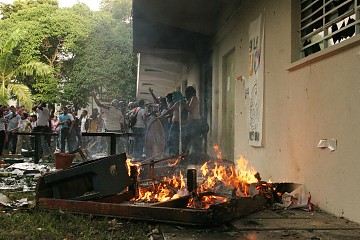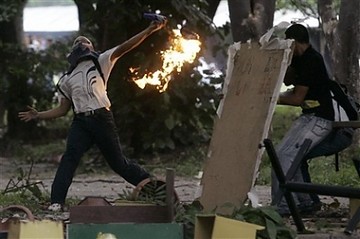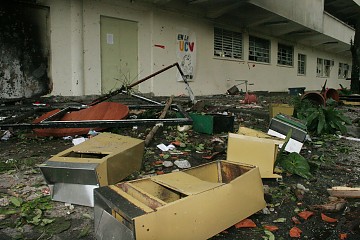The Truth about the Recent Campus Violence in Venezuela

Violent opposition students outside the School of Social Work (ABN)
I'm still in the thick of wedding mayhem, but I had to post something about the recent violence at the UCV campus in Caracas. This is another astounding example of the way the US media twists 180 degrees nearly every story coming out of Venezuela now (similar to the way the King of Spain has been applauded nearly everywhere for breaking all diplomatic niceties by telling telling President Chavez to "shut up" at a recent summit in Chile). Imagine any other democratically elected leader being told to shut up by a monarch.
U.S. Media Bias and Recent Student Violence in Venezuela
by JoJo Farrell for ZNET
November 15, 2007
Why is it that the U.S. media condemns Venezuelan President Hugo Chávez for limiting freedom of press while in the same breath self-censoring their Venezuelan news coverage to such an extent that it completely distorts the story? This has been the case ever since Chavez came to office, but last week, after the incidents at the Central Venezuelan University, the asymmetries once again were violently thrust to the surface.
Last week, in standard fashion, nearly every major US newspaper, momentarily forgot their commitment to an independent press, and omitted crucial facts, martyring the Venezuelan opposition student movement, and acting as a de facto mouthpiece for the opposition.
Sean McCormick, spokesperson for the US state Department had this to say, on the morning of November 8th, ³These people are just expressing themselves in a peaceful manner. They've had a view contrary to the views held by the government, but it was a peaceful protest, as far as I've been able to determine from the news reports.²
An analysis of 10 major U.S. media outlets shows very consistent reporting of the story (links below). Seven of the 10 reprinted the same AP story. Only the Washington Post, however briefly, brings to light that there are even two different sides. Most media outlets reported that following peaceful protests in downtown Caracas, masked Chavista-gunman attacked anti-government supporters on the campus of the Central University of Venezuela (UCV). Photos of the masked gunman have accompanied most of these articles lending themselves as powerful images of violence against peaceful protestors.

Violent oppositon supporters at the UCV- picture Reuters
The Miami Herald reported ³Photographers for The Associated Press saw at least four gunmen - their faces covered by ski masks or T-shirts - firing handguns at the anti- Chávez crowd at the UCV. Terrified students ran through the campus as ambulances arrived. The New York Times on Nov. 7th led with the following, ³Masked gunmen shot into a group of students on Wednesday at this country¹s most prestigious university. The students were returning from a march here protesting changes to the Constitution proposed by President Hugo Chávez that could allow him to remain in power indefinitely.² The following day, the Times printed a quote from one of the student leaders likening their tactics to those of Gandhi.
Unfortunately, these reports have left out an important chunk of the story. After last Wednesday¹s peaceful protest, many students headed back to UCV campus. Here is where things get complicated. According to Chávez supporters, eyewitnesses, and videotape recorded by the community TV station, Catia TV, opposition students, mainly from neighboring privates Universities, chased down a group of pro- Chávez students putting up signs in favor of the reform. The pro-Chavez group found refuge in the faculty of Social Work, which is known to be a Chávez friendly zone, and where it was also reported that another group of pro-Chavez students were meeting. The opposition students surrounded the faculty, armed with weapons, rocks, and gas masks shouting, ³We will lynch you all.² According to reports, opposition students fired weapons, threw rocks at the students inside the building, and lit fire to the entrance. Chávez supporters present that day affirm that the motorcyclists televised to the world as sinister gunmen, arrived on the scene as part of a rescue mission to help their companions trapped inside the building by the rabid opposition outside. They argue that this was necessary because the Venezuelan army or police force are, by law, not allowed to enter the grounds of the University. To this day, the entire truth is not known about the events at the UCV last Wednesday, but the inability of the international press to report an unbiased account calls into question their journalist integrity. The consequences of this could lead to further violence in Venezuela.
Media distortion is nothing new in Venezuela, the media played a critical role during the 2002 Coup de tat which removed Chávez from power temporarily. At the time major outlets ordered a black out of pro- Chávez street protests. The movement in the street ultimately led to the return of the President, and has encouraged a new generation of community media around the country. It was those small community stations that spread the news that wasn¹t available on the major outlets. What the private and international mainstream media reported, is that pro-government protesters had fired at opposition marchers, killing over a dozen. It was later revealed that video footage was manipulated, as were the reports, and that in fact the deaths were caused by snipers firing from the nearby buildings, and the pro-government protesters were defending themselves from the armored vehicles of the metropolitan police, advancing on the crowds from only a few blocks away. This past summer the Venezuelan government pointed to the role of Radio Caracas Television in the 2002 coup as the impetus for not renewing its broadcast license. This is a fact that was consistently left out of the story reported in the private and international media. The RCTV story read that Chávez was silencing the station due to their opposition to his policies. The same story, which continues to be perpetuated in the US media today. Unfortunately, this one-sided hypocrisy intentionally leaves out facts leading to one-sided coverage. This type of journalism not only misrepresents the truth, but its impact can have dangerous and lasting effects on Venezuela. We should call on our media to take more care, to ensure that it reports everything that is to be reported, and not just the image it wants to portray.

The School of Social Work trashed by opposition students (ABN)
Videos of the violent attack by opposition students can be seen here and here.
